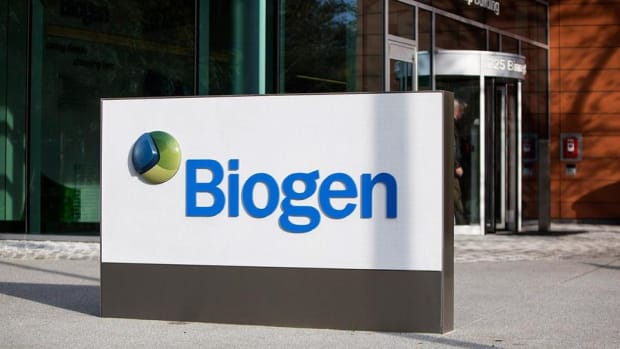Patients with amyotrophic lateral sclerosis -- known more prominently as ALS or Lou Gehrig’s disease -- die waiting for a miracle drug that could transform their quality of life.
ALS is a progressive neurodegenerative disease that affects nerve cells in the brain and spinal cord. The condition leads to paralysis -- inability to talk, eat, drink and breathe.
Movies like "The Theory of Everything," the biopic on cosmologist Stephen Hawking, who lived with the disease for 55 years, and the 2014 drama "You're Not You," starring Hilary Swank as a pianist suffering from ALS, have provided wide public understanding of this devastating disease.
The ALS Foundation estimates that 30,000 Americans have the disease at a given moment. It afflicts largely people aged 40 to 70, of all genders and races.

Biogen Ends ALS Drug Development
Biotech giant Biogen (BIIB) has halted development of an experimental treatment for ALS, citing lack of clinical benefit, the company said recently.
The setback comes as Biogen's costly Alzheimer's drug treatment continues to face regulatory scrutiny over its efficacy, even after it got a nod from the Food and Drug Administration last year.
"While these were not the results we were hoping for, they are clear and will inform future research across our broad pipeline of investigational ALS therapies," Biogen Vice President Toby Ferguson said in a statement.
"We remain focused on pioneering new treatments that will positively impact people living with this debilitating disease."
Ferguson also leads the neuromuscular development unit at Biogen. Biogen's new drug, BIIB078, was an antisense oligonucleotide meant to treat ALS patients with a specific genetic mutation, or the C9orf72 gene.
Antisense is a drug technology used to build genetically targeted drugs using DNA-like material. The ALS drug was being developed with Ionis Pharmaceuticals (IONS).
Biogen said patients who were administered 90mg of the drug as part of an early-stage clinical trial, "trended toward a greater decline than those in the placebo group across secondary endpoints."
"Unfortunately, this Phase 1 study did not support the hypothesis, suggesting that the disease mechanism is much more complex," Ionis Executive Vice President C. Frank Bennett said.
"While these results do not support further development of BIIB078, we anticipate they will provide valuable learnings that lead to a deeper understanding of this form of ALS,” added Bennett, who is also chief scientific officer and franchise leader for neurological programs at Ionis.
The results disappointed investors and patient groups who had hoped the drug could succeed where others have failed.
Biogen's stock has dropped 43% since the company's Alzheimer's drug, Aduhelm, received FDA clearance.







